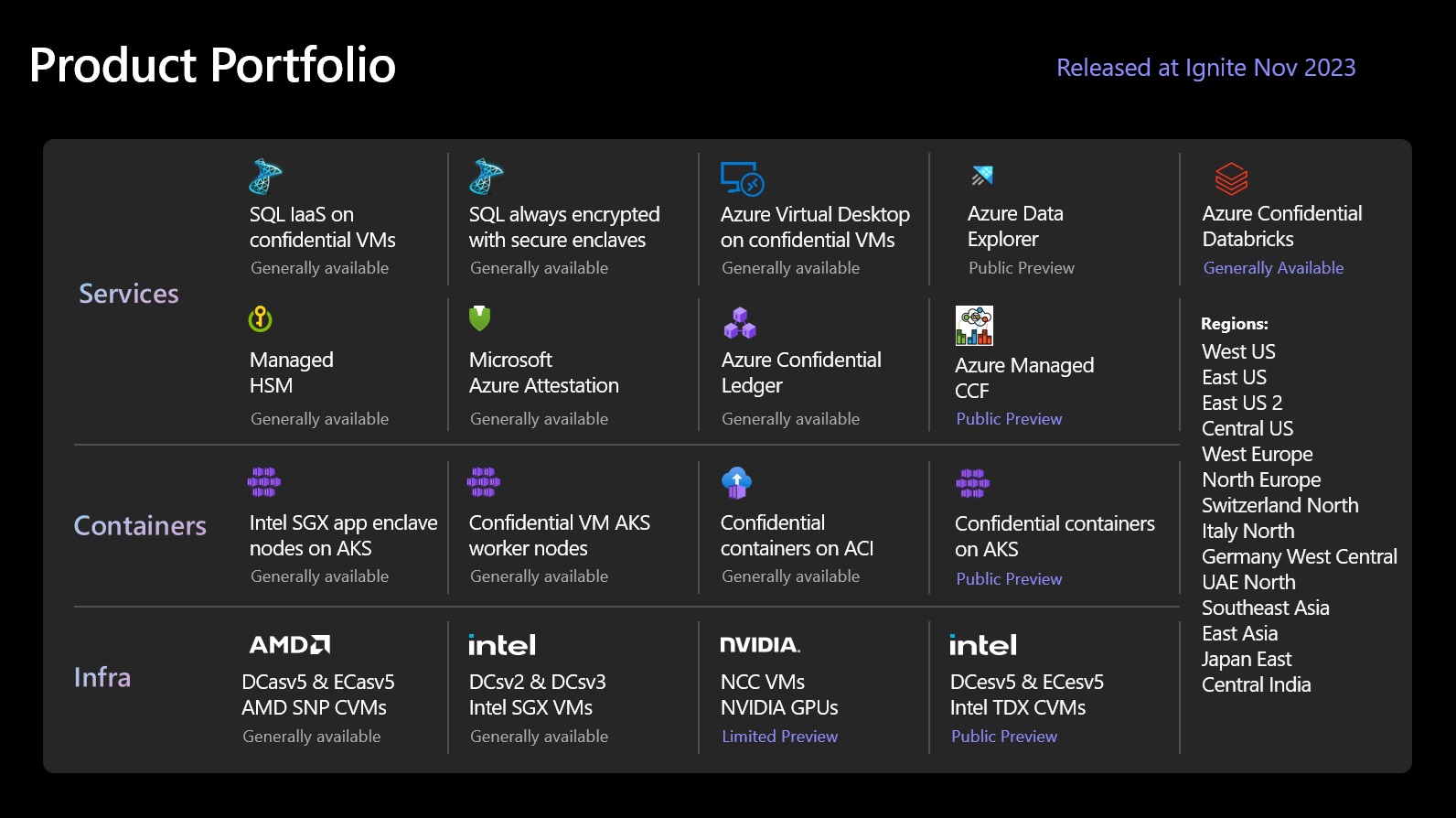Confidential Computing on Azure
Azure offers many tools to encrypt data at rest through models such as client-side encryption and server-side encryption. Additionally, Azure offers mechanisms to encrypt data in transit through secure protocols like TLS and HTTPS. Confidential computing addresses the protection of data in use, helping you extend encryption protections.
Using confidential computing technologies, you can harden your virtualized environment from the host, the hypervisor, the host admin, and even your own VM admin. This helps organizations to:
Prevent unauthorized access: Run sensitive data in the cloud. Trust that Azure provides the best data protection possible, with little to no change from what gets done today.
Meet regulatory compliance: Migrate to the cloud and keep full control of data to satisfy government regulations for protecting personal information and secure organizational IP.
Ensure secure and untrusted collaboration: Tackle industry-wide work-scale problems by combing data across organizations, even competitors, to unlock broad data analytics and deeper insights.
Isolate processing: Offer a new wave of products that remove liability on private data with blind processing. User data can't even be retrieved by the service provider.
What's new in Azure confidential computing
Azure offerings
Confidential computing support continues to expand, from foundational virtual machines, to GPU-backed offerings, and up the stack via containers, and managed services.
Verifying that applications are running confidentially form the very foundation of confidential computing. This verification is multi-pronged and relies on the following suite of Azure offerings:
Microsoft Azure Attestation, a remote attestation service for validating the trustworthiness of multiple Trusted Execution Environments (TEEs) and verifying integrity of the binaries running inside the TEEs.
Azure Key Vault Managed HSM, a fully managed, highly available, single-tenant, standards-compliant cloud service that enables you to safeguard cryptographic keys for your cloud applications, using FIPS 140-2 Level 3 validated Hardware Security Modules (HSM).
Trusted Hardware Identity Management, a service that handles cache management of certificates for all TEEs residing in Azure and provides trusted computing base (TCB) information to enforce a minimum baseline for attestation solutions.
Trusted Launch is available across all Generation 2 VMs bringing hardened security features – secure boot, virtual trusted platform module, and boot integrity monitoring – that protect against boot kits, rootkits, and kernel-level malware.
Azure Confidential Ledger. ACL is a tamper-proof register for storing sensitive data for record keeping and auditing or for data transparency in multi-party scenarios. It offers Write-Once-Read-Many guarantees, which make data non-erasable and non-modifiable. The service is built on Microsoft Research's Confidential Consortium Framework.
Azure IoT Edge supports confidential applications that run within secure enclaves on an Internet of Things (IoT) device. IoT devices are often exposed to tampering and forgery because they're physically accessible by bad actors. Confidential IoT Edge devices add trust and integrity at the edge by protecting the access to data captured by and stored inside the device itself before streaming it to the cloud.
Always Encrypted with secure enclaves in Azure SQL. The confidentiality of sensitive data is protected from malware and high-privileged unauthorized users by running SQL queries directly inside a TEE.
Technologies such as AMD SEV-SNP, Intel SGX and Intel TDX provide silicon-level hardware implementations of confidential computing. We provide the following technologies today:
VMs with Intel SGX application enclaves. Azure offers the DCsv2, DCsv3, and DCdsv3 series built on Intel SGX technology for hardware-based enclave creation. You can build secure enclave-based applications to run in a series of VMs to protect your application data and code in use.
App-enclave aware containers running on Azure Kubernetes Service (AKS). Confidential computing nodes on AKS use Intel SGX to create isolated enclave environments in the nodes between each container application.
Confidential VMs based on AMD SEV-SNP technology enable lift-and-shift of existing workloads and protect data from the cloud operator with VM-level confidentiality.
Confidential VMs based on Intel TDX technology enable lift-and-shift of existing workloads and protect data from the cloud operator with VM-level confidentiality.
Confidential Inference ONNX Runtime, a Machine Learning (ML) inference server that restricts the ML hosting party from accessing both the inferencing request and its corresponding response.
Next steps
Feedback
Coming soon: Throughout 2024 we will be phasing out GitHub Issues as the feedback mechanism for content and replacing it with a new feedback system. For more information see: https://aka.ms/ContentUserFeedback.
Submit and view feedback for
